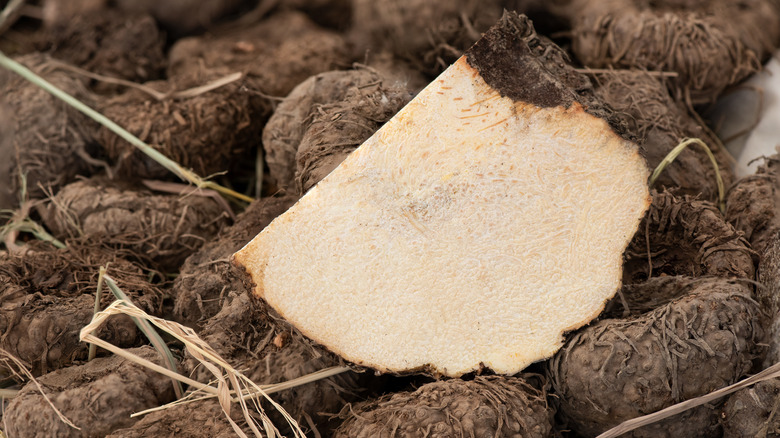Why You Should Be Adding More Konjac To Your Diet
Have you ever tried konjac flour, rice, or noodles? If not, it might be time to incorporate them into your recipes. Amorphophallus konjac, a plant native to Asian countries, has been used as food and medicine for over 2,000 years, notes a 2010 review published in the Journal of Ethnopharmacology. In traditional Chinese Medicine, it's believed to improve detoxification and suppress tumor growth. Today, konjac can be found in a wide range of food products, beverages, and dietary supplements. Konjac flour is also naturally gluten-free, making it suitable for a wide range of diets, according to a 2021 study presented in the journal Foods.
Konjac is touted for its many perceived health benefits. Research suggests that by eating konjac regularly, you may reduce your risk of chronic illnesses like obesity, diabetes, inflammation, support immune function, and other risk factors for heart disease, per a recent study featured in the journal Nutrients. It's even been shown to lower cholesterol levels, triglycerides, and blood pressure, as well as blood sugar and insulin levels. What's more, it can give you an extra boost of something you may be lacking.
Konjac can boost your fiber intake
Most of us aren't getting enough fiber in our diets. But what makes konjac stand out is its high fiber content. In fact, one serving (8 ounces) of konjac noodles, or shirataki noodles, has only 6 grams of carbs, 20 calories, and a whopping 6 grams of fiber per serving (via WebMD). Specifically, konjac is an excellent source of glucomannan, a dietary fiber that aids in digestion. After ingestion, it helps to fill and expand the stomach, leaving you feeling full, reports a 2020 study published in the Journal of Functional Foods. According to the research, those who consumed up to 3 grams of glucomannan per day in three doses as part of an energy-restricted diet were more likely to experience weight loss.
Furthermore, like many high-fiber foods, it can slow sugar absorption in the body, which may improve glycemic control and blood lipids, explains WebMD. The research is mixed, though. For example, a review of nine clinical trials found no significant association between glucomannan intake and weight loss, reports the Journal of the American College of Nutrition. What's more, subjects experienced constipation, diarrhea, and digestive distress. Other studies suggest that glucomannan may improve body composition when combined with a balanced diet and regular exercise, according to the journal Metabolism. However, subjects had a sedentary lifestyle prior to participating in the study, so their results may have been due to exercise, which included both resistance and aerobic training.


